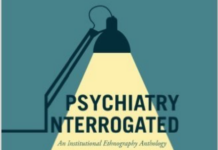Book Review: Depression Delusion by Terry Lynch, MD, MA
In this truly remarkable — and meticulously researched — volume, Dr. Lynch annihilates psychiatry's cherished chemical imbalance theory of depression. Every facet of this theory, which the author correctly calls a delusion, is critically analyzed and found wanting. Please read Depression Delusion, keep it close to hand for reference, and encourage others to read it also. Ask your library to buy a copy. The spurious chemical imbalance theory is now so widely accepted that it will take enormous efforts to dislodge it. In any debate on this matter, Dr. Lynch's book will, quite literally, put the facts at your fingertips.
Book Review: Psychiatry Reconsidered
Hugh Middleton, MD, Associate Professor at the School of Sociology and Social Policy, University of Nottingham, and NHS Consultant Psychiatrist, Nottinghamshire Healthcare NHS Trust has written an interesting and worthwhile book, “Psychiatry Reconsidered, From Medical Treatment to Supportive Understanding.” Dr. Middleton is co-founder of the Critical Psychiatry Network and this book could serve as the foundational textbook for our field. As his academic appointment would suggest, he has a decidedly social perspective on the kinds of problems that bring many people to a psychiatrist’s attention, but in this book he offers eloquent discussions of many perspectives that inform our field. It is remarkable that in this 200 page text, he is able to cover so many topics – diagnosis, pharmacotherapy, schools of psychotherapy - with such clarity.
Mental Health: Misnomer & Metaphor
“Mental health” — a misnomer? If you don’t subscribe to the notion of “mental illness,” why “mental health”? Why not the straightforward acceptance that individuals will act in a manner peculiar to each? In short, why not an existential or phenomenological understanding of human behavior as rooted in an individual’s idiosyncrasies and life experiences rather than in her/his brain chemistry?
Psychiatry Interrogated: A Book Review
Psychiatry routinely presents itself as a legitimate medical specialty differing from the other specialties only in the kinds of illnesses treated. But there is another important difference between psychiatry and real medicine. Psychiatry's core concepts are embedded formally and informally in our legal, social, educational, and workplace institutions in ways that the other medical specialties are not.
Diagnosing the Diagnostic and Statistical Manual of Mental Disorders
What can we say about the DSM that hasn’t already been said? Quite a lot, actually. The manual (full title: the Diagnostic and Statistical Manual of Mental Disorders), produced by the American Psychiatric Association, is incredibly powerful. It shapes research agendas, clinical practices, social care, economic decision-making and individual experiences internationally. As Rachel Cooper notes in her excellent new book, Diagnosing the Diagnostic and Statistical Manual of Mental Disorders, changes to it impact ‘the lives of as many people as changes in the policies of most countries’ (p. 2). The DSM needs to be talked about.
Book Review: Tales From The Madhouse, by Gary Sidley
Earlier this year the British publisher PCCS Books published Tales From The Madhouse: An insider critique of psychiatric services, by Gary Sidley. Gary's criticisms of psychiatry are cogent and convincing. But in addition he has drawn on his extensive experience working in the system to describe in close detail psychiatry's devastating effects in the lives and hopes of real people. Through Gary's sensitively written anecdotes, psychiatry's "treatments" are exposed as the disempowering, hope-destroying tactics that they are.










